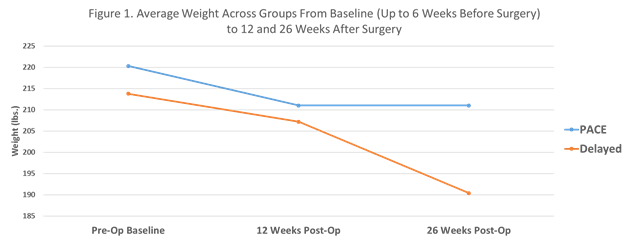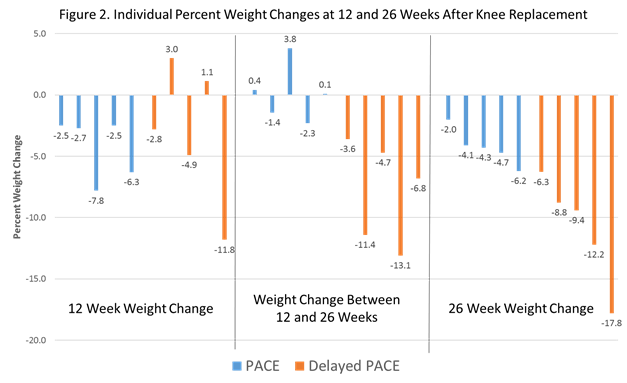Session Information
Date: Tuesday, November 7, 2017
Title: ARHP: Exemplary Abstracts
Session Type: ARHP Concurrent Abstract Session
Session Time: 4:30PM-6:00PM
Background/Purpose: Most patients risk gaining weight in the years after knee replacement, adding further concern to a population that is mostly overweight/obese prior to surgery. Based on patient and stakeholder input and the Self-Determination Theory, we adapted the Diabetes Prevention Program to create the Patient-Centered Weight Loss Program (PACE). The purpose of the study was to compare changes in weight, function, and patient-reported outcomes between PACE programs initiated either before or after knee replacement.
Methods: Consented patients scheduled for knee replacement were randomized to a 14 session weight loss program starting either ≤6 weeks before surgery (PACE) or at 12 weeks post-op (Delayed PACE). All participants were provided a calorie goal to facilitate a 5% weight loss and were encouraged to increase physical activity. Patients were encouraged to self-monitor diet and activity using their preferred method (paper, web, app, Fitbit) and selected weekly or biweekly coaching sessions based on preference. Weight, function, and patient-reported outcomes using Patient-Reported Outcomes Measurement Information System (PROMIS) were assessed at baseline (pre-op), 12, and 26 weeks after surgery. Repeated measures ANOVAs were used to examine changes in outcomes across time and group.
Results: Ten participants (5 randomized to PACE and 5 to Delayed PACE) completed the PACE intervention (mean±SD 62.2±7.9 years, 60% female, 80% White, BMI 35.2±5.4 kg/m2). Participants completed an average of 9.6±2.2 coaching sessions that were 15.2±3.4 minutes in duration. A significant effect for time (P<0.001) and a time by group interaction (P=0.01) were observed on weight change. Improvements over time were seen for all functional outcomes and patient-reported outcomes with the exception of sleep disturbance. No baseline differences were seen between groups.
Conclusion: Starting a patient-centered weight loss program either before or after knee replacement resulted in significant weight losses at 12 and 26 weeks post-op. Patients appear to naturally lose weight immediately post-op; hence waiting to start a weight loss program 12-weeks post-op may initiate greater weight loss during the first 6 months after surgery as compared to those who start ≤6 weeks pre-op.
|
Table 1. Weight, Physical Function, and Patient-Reported Outcomes Between Groups |
||||||
|
Outcome |
PACE (n=5) |
Delayed (n=5) |
Mean Group (Delayed – PACE) Difference (95% CI) |
P values |
||
|
Mean ± SD |
Group |
Time |
Group x Time |
|||
|
Body Weight |
|
|
|
|
|
|
|
Weight (lbs) Baseline 12 Weeks 26 Weeks |
220.3 ± 24.1 211.0 ± 25.7 211.0 ± 23.8 |
213.8 ± 22.2 207.2 ± 25.0 190.4 ± 20.5 |
2.7 (-10.8, 16.2) -14.1 (-24.9, -3.2) |
0.50 |
<0.001** |
0.01* |
|
Physical Function |
|
|
|
|
|
|
|
Timed Up & Go (secs) Baseline 12 Weeks 26 Weeks |
9.2 ± 1.9 8.3 ± 1.0 7.8 ± 0.7 |
8.0 ± 2.8 7.2 ± 1.7 7.1 ± 1.3 |
0.04 (-1.7, 1.8) 0.5 (-1.8, 2.8) |
0.35 |
0.03* |
0.79 |
|
6 Minute Walk (Feet) Baseline 12 Weeks 26 Weeks |
1173.5 ± 323.1 1393.7 ± 365.1 1489.0 ± 430.9 |
1333.5 ± 314.1 1499.0 ± 370.9 1642.2 ± 445.5 |
-54.7 (-221.1, 111.7) -6.8 (-266.7, 253.1) |
0.57 |
<0.001** |
0.79 |
|
Chair Stands (stands/30 secs) Baseline 12 Weeks 26 Weeks |
10.4 ± 2.4 11.0 ± 3.7 13.2 ± 3.1 |
10.6 ± 2.9 14.2 ± 4.1 15.0 ± 3.8 |
3 (-.0.6, 6.6) 1.6 (-0.3, 3.5) |
0.42 |
<0.001** |
0.09 |
|
PROMIS Outcomes |
|
|
|
|||
|
Pain Intensity (t score) Baseline 12 Weeks 26 Weeks |
51.7 ± 5.8 44.1 ± 4.4 38.0 ± 4.2 |
51.6 ± 5.1 43.6 ± 7.9 37.0 ± 9.6 |
-0.3 (-9.4, 8.8) -0.9 (-12.3, 10.5) |
0.88 |
<0.001** |
0.98 |
|
Pain Interference (t score) Baseline 12 Weeks 26 Weeks |
58.8 ± 5.6 54.4 ± 3.2 49.4 ± 7.2 |
60.3 ± 4.0 53.0 ± 8.3 44.5 ± 8.6 |
-2.9 (-11.5, 5.6) -6.4 (-20.1, 7.4) |
0.60 |
0.001* |
0.46 |
|
Mobility (t score) Baseline 12 Weeks 26 Weeks |
36.2 ± 5.1 40.6 ± 7.2 42.2 ± 3.5 |
37.6 ± 3.4 43.7 ± 5.4 47.8 ± 7.5 |
1.7 (-5.2, 8.5) 4.1 (-4.0, 12.2) |
0.30 |
<0.001** |
0.43 |
|
Sleep Disturbance (t score) Baseline 12 Weeks 26 Weeks |
52.0 ± 9.2 51.7 ± 10.4 44.7 ± 5.5 |
53.2 ± 6.0 52.3 ± 4.5 49.4 ± 9.1 |
-0.5 (-11.6, 10.5) 3.5 (-8.1, 15.0) |
0.60 |
0.07 |
0.68 |
To cite this abstract in AMA style:
Pellegrini C, Chang RW, Dunlop DD, Conroy D, Lee J, VanHorn L, Spring B, Cameron K. Preliminary Comparison of Patient-Centered Weight Loss Programs Starting before Versus after Knee Replacement [abstract]. Arthritis Rheumatol. 2017; 69 (suppl 10). https://acrabstracts.org/abstract/preliminary-comparison-of-patient-centered-weight-loss-programs-starting-before-versus-after-knee-replacement/. Accessed .« Back to 2017 ACR/ARHP Annual Meeting
ACR Meeting Abstracts - https://acrabstracts.org/abstract/preliminary-comparison-of-patient-centered-weight-loss-programs-starting-before-versus-after-knee-replacement/


